What Happens If Edema Is Left Untreated?
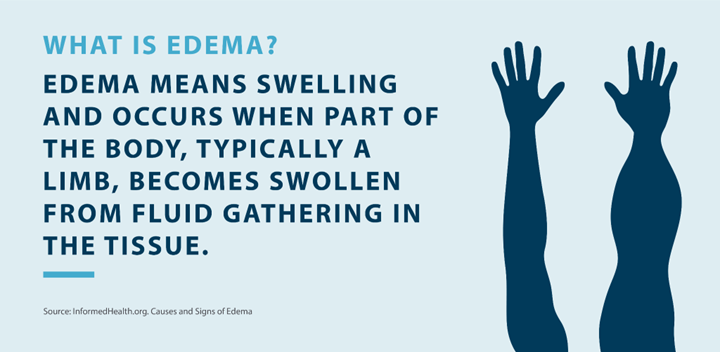

Edema is a condition that occurs when fluid builds up in the tissue of your body. In most cases, edema doesn’t pose any health risks if managed, but what happens if edema is left untreated? Edema left untreated can continue to get worse, leading to increased swelling, blisters, and more. Visiting a doctor for edema treatment is important, especially if you haven’t attempted to find treatment options.
The difficult part about living with edema is that it can be hard to identify the root cause, making it challenging to find a treatment. Fortunately, there are several ways to manage symptoms of edema, such as the use of compression garments and making lifestyle changes. However, if edema is left untreated, it can lead to health complications.
While the consequences of untreated edema start out fairly small, those consequences can worsen the longer you leave edema untreated. In some cases, untreated edema can lead to scarring, skin ulcers, infections, and more. Read our guide below to learn more about what happens if edema is left untreated and how to treat it.
What Is Edema?
Edema is a term used to refer to swelling that occurs as a result of built-up fluid in your body’s tissues. When fluid that’s supposed to be stored in blood vessels or other parts of the body enters the tissues, it can cause extremities to swell. In many cases, swelling occurs in the arms, legs, hands, and feet. However, edema can occur in any area of the body, such as the head, neck, chest, abdomen, and genitals.

As far as risk factors and causes go, edema can occur for many reasons. It could be a result of a medical condition you have, or it could be caused by an allergic reaction like a bee sting. Edema may or may not be permanent depending on the cause. Even in cases of chronic edema, there are treatment options that can help people living with edema manage their symptoms and relieve pain and swelling.
What Are the Symptoms of Edema?
Because untreated edema can lead to further complications, getting treatment early on is important. If you’re experiencing these symptoms of edema, you should visit a doctor for a professional diagnosis:
- Swelling: Edema is a condition characterized by swelling, so swelling is the most noticeable symptom you’re going to experience with edema. This commonly occurs in the lower extremities, as that’s where fluid tends to pool up. However, swelling can occur in the head, neck, arms, hands, chest, abdomen, and groin. The level of swelling depends on the amount of fluid, and also has an effect on the severity of the other symptoms associated with edema.
- Stretched/shiny skin: When your skin swells up with fluid as a result of edema, it may also become stretched and shiny. You may notice that your skin feels a bit smoother than normal or has an abnormally shiny appearance. Edema may lead to other skin conditions depending on the severity of your condition, which is why it’s important to get a diagnosis and begin treatment as soon as possible.
- Increased abdominal size: Your abdomen is one of the places fluid can gather as a result of edema, which means edema can lead to an increase in abdominal size. Your abdomen may also have a swollen appearance with stretched or shiny skin depending on how swollen it is. The fluid that collects in the lining of the abdomen is known as ascites.
- Skin that remains indented after pressing on it: With some swelling, you can press your finger on the swollen area, and it will immediately return to its previous shape when you remove your finger. An indent that remains in a swollen area after you press down on it is known as pitting, and it can be a sign of edema. Pitting edema is categorized based on the depth of the indentation and how long it takes for the skin to rebound. Treatment options may depend on the categorization of the pitting.
- Pain: Swelling from edema can result in pain, whether that’s a dull ache in an extremity or swollen areas that are sensitive to the touch. For people living with chronic edema, pain management is one of the key focuses of managing edema. It’s important to note that edema can present without pain, especially in more minor cases of edema.
Keep in mind that edema symptoms may vary from person to person. Only your doctor can determine what’s causing your edema and can recommend the proper treatment options.
What Causes Edema?
Edema can be caused by several things, and there’s a difference between acute edema. Understanding the cause of your edema can help you decide on a treatment option. Here are some of the most common causes of edema:
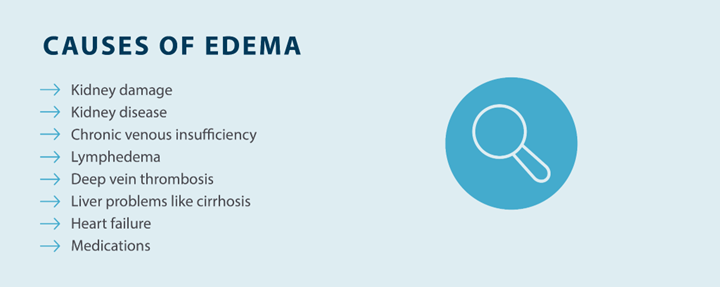
- Kidney damage: When your kidneys can’t filter out excess water and waste, that buildup of fluid can lead to edema. This may occur as a result of damage to the kidneys, especially the blood vessels in the kidneys.
- Kidney disease: Edema may be caused by nephrotic disease, which is a kidney condition that’s often caused by damage to the blood vessels in your kidneys. These blood vessels are responsible for filtering out extra water and waste from your blood. When they’re not working properly, it can lead to a buildup of that excess fluid that can cause edema.
- Chronic venous insufficiency (CVI): Chronic venous insufficiency is a medical condition where the valves in the veins in the legs don’t work properly, which causes blood to pool up in the lower part of the body. This condition is a somewhat common cause of edema, especially based on your medical condition and history.
- Lymphedema: Lymphedema is caused by a buildup of excess lymph fluid as a result of a malfunctioning lymphatic system. This can occur as a result of cancer, cancer surgery, radiation therapy, and other medical conditions affecting the lymphatic system. If you’re living with lymphedema, your doctor can prescribe treatment options, such as pneumatic compression devices or garments, to manage your symptoms.
- Deep vein thrombosis (DVT) or blood clot: Deep vein thrombosis, what most people call a blood clot, is a clot that occurs in the deep veins. These clots are somewhat common in the lower extremities, and they may cause a buildup of blood in your legs and feet. If you have any symptoms of DVT, you should visit your doctor or a hospital as soon as possible.
- Liver problems: Problems with liver function can lead to edema, especially cirrhosis. Increased pressure in the portal vein as a result of slower blood flow can cause fluid to accumulate in the legs as well as the abdomen.
- Heart failure: When your heart can’t pump blood well, it can lead to a buildup of excess blood in parts of your body. It’s not uncommon for people with heart failure to experience edema at some point as a result of the damage to their heart.
- Medication: Certain medications can also cause edema as a side effect, which is something your doctor may mention when you begin taking these medications. For example, edema can be caused by non-steroidal anti-inflammatory drugs (NSAIDs), high blood pressure medication, and corticosteroids. It’s important to talk to your doctor and follow any instructions you receive before taking these medications.
What Are the Consequences of Untreated Edema?
Now that you know about some of the symptoms and causes of edema, what happens if edema is left untreated? While edema might seem manageable at first, the symptoms can continue to get worse as more fluid builds up, especially if you don’t address the root cause of your edema. Some cases of edema may be permanent, but you can still take steps to reduce the swelling, relieve the pain, and slow down some of the damage that edema can cause over time.
The consequences of neglecting edema treatment depend on the cause of the edema. Edema that’s caused by another medical condition that’s left untreated can continue to worsen if you don’t treat the underlying condition.
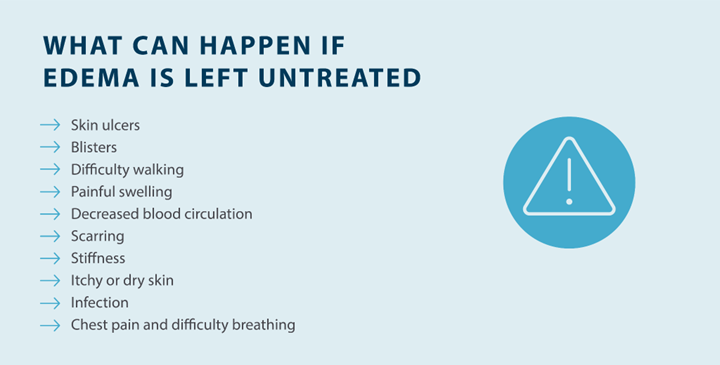
- Skin ulcers: Skin ulcers are a fairly common complication of edema. As fluid pools in certain areas of the body, it causes changes in the skin that can eventually lead to skin ulcers. These ulcers may become infected and painful or present other complications. If you have ulcers, it’s important to clean, dress, and protect your wounds.
- Blisters: Edema bullae are a type of blister that can occur as a result of edema. These blisters are most common in elderly patients or people who have edema and are immobile. However, they may occur in other patients living with edema. Blisters can also lead to infections, especially if they break.
- Difficulty walking: As the swelling in your lower extremities progresses, you may reach a point where it’s difficult to walk. Difficulty walking occurs as a result of inflammation in the joints, which can affect the quality of life in those living with edema. Over time, this inflammation and immobility may escalate.
- Painful swelling: While edema doesn’t always present with pain, it’s not uncommon for swelling to reach a point that causes pain. Painful swelling is one of the signs of edema left untreated, and that pain may continue to worsen as swelling intensifies. Treating the cause of your edema can help relieve swelling and the pain that comes with it.
- Decreased blood circulation: If your heart and veins aren’t moving blood throughout your body, it can pool up and lead to edema. That edema can, in turn, cause more damage to your circulatory system. People who are experiencing circulation problems in addition to edema should see a doctor to decide on an edema treatment plan.
- Scarring: In some cases, edema may lead to scarring that results from the damage it can cause to your skin. A lack of blood flow or the constant pressure of built-up fluid can cause dermatitis and other skin conditions, which can lead to scarring if left untreated.
- Stiffness: As swelling increases and edema is left untreated, stiffness continues to increase. While stiffness may be relatively minor at first, it can escalate if you don’t treat it, eventually affecting your ability to walk, bend your knees, and more.
- Itchy or dry skin: Itchy and dry skin are common side effects of edema. Swelling and stretching of the skin can cause it to dry out and become itchy, which can leave your skin dry and irritated. In severe cases, dry skin can increase your risk of infection and lead to other complications.
- Infection: From cracks in dry skin to blisters and ulcers, there are several ways to get an edema-related infection. When you have edema, it’s important to carefully dress any wounds and avoid any cuts or needle pricks.
- Chest pain and difficulty breathing (pulmonary edema): A buildup of fluid in the lungs, or pulmonary edema, can cause chest pain and make it difficult to breathe. If you’re experiencing these symptoms along with an enlarged look and feel in the chest, visit a doctor for a diagnosis.
How Is Edema Diagnosed?
Going to the doctor to have edema diagnosed is important. In order to diagnose edema, your doctor will perform a physical exam and look at your medical history to determine your risk factors for edema. Understanding when your symptoms started and how severe your edema is can help your doctor develop a treatment plan that’s better suited for you.
Your doctor may also perform tests in order to diagnose edema, including:
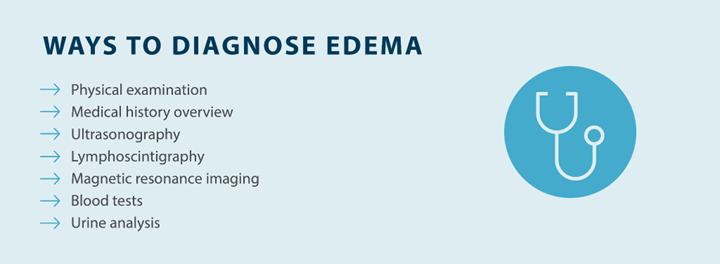
- Ultrasonography: Ultrasonography allows doctors to get visual confirmation that tissues have been affected by edema. This is a fairly simple test that makes it easy for doctors to discover edema.
- Lymphoscintigraphy: A lymphoscintigraphy provides pictures of your lymphatic system, which makes it a helpful tool in diagnosing lymphedema. However, this test isn’t used for other types of edema.
- Magnetic resonance imaging: An MRI can be used to determine the presence and severity of edema. Edema will show up on an MRI, but these tests aren’t always necessary in terms of diagnosing edema.
- Blood tests: If you have a disruption with your circulatory or lymphatic system, that condition may show up in a blood test. Blood tests are a good way to spot circulation-related edema as well as lymphedema, so your doctor may want to run blood tests to aid with your diagnosis.
- Urine analysis: Like a blood test, a urine analysis can provide crucial information when diagnosing edema that may be caused by kidney disease or kidney damage.
Getting a proper diagnosis from your doctor can help determine if you have edema and rule out any other conditions that might pose similar symptoms to ensure you get the necessary interventions.
How Do You Treat Edema?
The good news about edema is that there are treatment options available for its various types. While chronic edema typically can’t be cured, you can get relief from the symptoms that come with edema to live a happy, healthy life. Here are some of the edema treatment options:
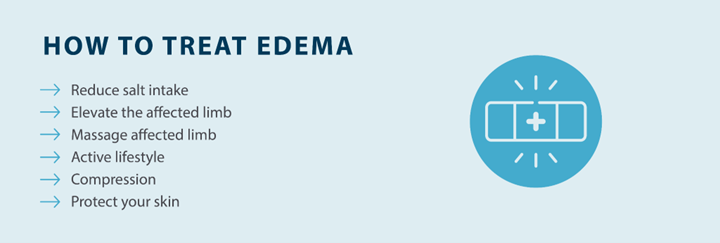
- Reduce salt intake: A diet that’s high in salt can lead to increased water retention, which can cause edema in some cases. While salt may not be the cause of your edema, it could still be a contributing factor.
- Elevate the affected limb: By elevating the limb, you allow fluid to drain, which can help reduce pain and swelling.
- Massage affected limb: Massaging the affected limb can help relieve some of the pain and swelling, especially when combined with elevation.
- Active lifestyle: Staying active helps with circulation and keeps fluid moving throughout your body, which can provide relief from edema.
- Compression: Compression garments squeeze the swollen area to encourage the flow of fluids, helping relieve swelling and symptoms.
- Protect your skin: By protecting your skin, you can avoid infections and other complications that may come with edema.
In addition to these measures, edema can be treated with the use of a pneumatic compression device. At Tactile Medical, you can find head and neck treatment, upper body treatment, and lower body treatment with our Flexitouch Plus system. Our lymphedema treatment and management tool helps stimulate your lymphatic system to relieve swelling and symptoms. If you’re living with edema, reach out to your doctor today. Our edema treatment systems are doctor-prescribed and recommended for at-home use, so you can treat and manage your symptoms in an area you’re most comfortable in.
The Bottom Line: Untreated Edema
Treating edema is an important part of avoiding the complications that can come with it. The sooner you get a diagnosis and start edema treatment, the less likely you are to experience infections, ulcers, and dry skin. If you’re living with edema, contact Tactile Medical to learn more about the Flexitouch Plus system and how it helps with lymphedema treatment.